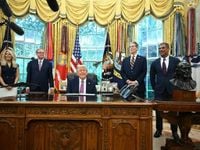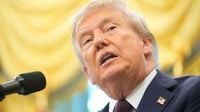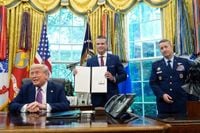On September 5, 2025, President Donald Trump signed an executive order that has sent ripples through Washington and across the globe: the Pentagon is being rebranded as the "Department of War," a move the president says restores the military’s historic identity and signals a renewed focus on its core mission. According to CNN, signage outside Defense Secretary Pete Hegseth’s office was updated within hours, and the Defense Department’s website now prominently displays its new title. The old defense.gov address now redirects visitors to war.gov, where “U.S. Department of War” headlines the homepage.
Trump’s rationale for the change was clear. In the Oval Office, he described "Department of War" as a more “appropriate” name, given the current state of global affairs and the military’s primary mission. “It sends a message of victory,” Trump said, asserting that the new title better reflects the Pentagon’s role in waging and winning wars. The president also dismissed concerns about congressional approval, stating, “We don’t need Congress to approve a name that’s always been ours.”
Republican Missouri Senator Josh Hawley, appearing on Fox News’s “The Ingraham Angle,” threw his full support behind the move. “Absolutely, of course,” Hawley said when asked if he backed the rebrand. “I see this as about getting back to mission, Laura. Which is about recruiting war fighters to fight the wars that protect America.” Hawley was sharply critical of the previous administration, claiming, “What Biden did for the last four years by turning the military into a giant DEI seminar has got to end.” Hawley also lambasted the Pentagon’s policies under President Biden, particularly the inclusion of transgender surgeries in military facilities and funding for abortions. “It’s totally outrageous,” he said, adding, “They should be defending America. To me, that is what this is all about. I welcome the change.”
Defense Secretary Pete Hegseth echoed the sentiment, telling the Daily Caller News Foundation that the name change is part of a “deeper cultural reset” within the military’s leadership. Hegseth’s focus, he said, is on rebuilding a fighting mentality among America’s troops—something he believes has been diluted in recent years. To that end, Hegseth has ordered the creation of Joint Interagency Task Force 401, a new unit tasked with unifying anti-drone operations across all military branches. Army Secretary Dan Driscoll will lead the group, which replaces a previous Army-only initiative and draws on broader resources to strengthen air defenses both at home and abroad. The Army has already tested key systems under “Project Flytrap,” running real-time exercises in Poland as drone warfare continues to reshape battlefields worldwide.
The rebranding comes at a time of heightened global tension, with Trump warning that Venezuelan military aircraft would be shot down if they put Americans in danger. According to CNN, the president is weighing potential military strikes against drug cartels, including operations inside Venezuela. “If Venezuelan military aircraft put Americans in a dangerous position, they will be shot down,” Trump warned, as his administration ramps up its efforts to combat cartels in the region. Sources told CNN that strikes against cartels are under serious consideration.
Meanwhile, the administration is intensifying its crackdown on crime at home. In Washington, DC, the deployment of National Guard troops has become a flashpoint. The city’s attorney general, Brian Schwalb, filed a lawsuit arguing that the federal deployment undermines local autonomy and damages the economy. However, Trump’s team remains undeterred. White House deputy chief of staff Stephen Miller told reporters, “DEA, ATF, FBI have only just begun to identify, disrupt and dismantle the criminal organizations that have been wreaking havoc on the city for so long.”
Several Republican-led states, including Georgia, are sending National Guard soldiers to the capital, responding to what they see as a federal call to restore public safety. Georgia Governor Brian Kemp announced the deployment of 300 soldiers, while six other GOP-governed states have followed suit. The federal emergency declaration for DC is set to expire on September 10, but the White House has signaled that the National Guard and federal law enforcement presence may continue regardless.
Trump’s law-and-order message was not limited to the nation’s capital. The president criticized what he described as “paid agitators” in Portland, Oregon, threatening federal intervention to “wipe out” groups he claims are destabilizing the city. “These are paid agitators. They get paid money by radical left groups,” Trump said, adding, “They’ve ruined that city. Living there is like living in hell.” During his first term, federal agents were deployed to Portland amid protests, and Trump’s recent comments suggest a willingness to repeat such measures if he deems it necessary.
The executive order restoring the “Department of War” title also authorizes the use of secondary titles such as “Secretary of War” and “Deputy Secretary of War” in official correspondence and ceremonial contexts. Former Senate Republican Leader Mitch McConnell, now chairing the Defense Appropriations Subcommittee, expressed skepticism about the rebrand. “The Pentagon needs investment, not just rebranding,” McConnell stated, emphasizing his long-standing push for greater funding and modernization of the military.
Internationally, Trump announced that the 2026 G20 summit will be held at his Doral golf club in Miami, a move that has drawn both intrigue and criticism. Trump said he would “love” for Russian President Vladimir Putin and Chinese President Xi Jinping to attend, signaling a willingness to engage with global rivals on American soil. “We will not make any money on it,” Trump insisted, referencing past criticism for hosting international summits at his own properties.
On other fronts, Trump addressed a range of issues in the Oval Office. He distanced himself from Florida’s decision to eliminate school vaccine requirements, stating, “I think you have to be very careful when you say that some people don’t have to be vaccinated.” He also voiced support for standard childhood immunizations, calling them “not controversial at all.” The president further commented on the ongoing war in Gaza, revealing that his administration is “in very deep negotiations with Hamas” to secure the release of Israeli hostages. “It’s going to be nasty—that’s my opinion, Israel’s choice, but that’s my opinion,” he said, emphasizing the gravity of the situation.
In a move aimed at protecting Americans abroad, Trump signed an executive order creating a “state sponsor of wrongful detention” designation, designed to penalize countries that wrongfully imprison U.S. citizens. The measure could also restrict Americans from traveling to nations known for detaining U.S. nationals.
As the Pentagon’s new “Department of War” branding rolls out, the debate over its symbolism and substance is only just beginning. Supporters see it as a necessary return to military fundamentals, while critics argue that rebranding alone won’t address the complex challenges facing the armed forces. For now, the new name stands as a bold statement of intent in an era of renewed global uncertainty and domestic division.



